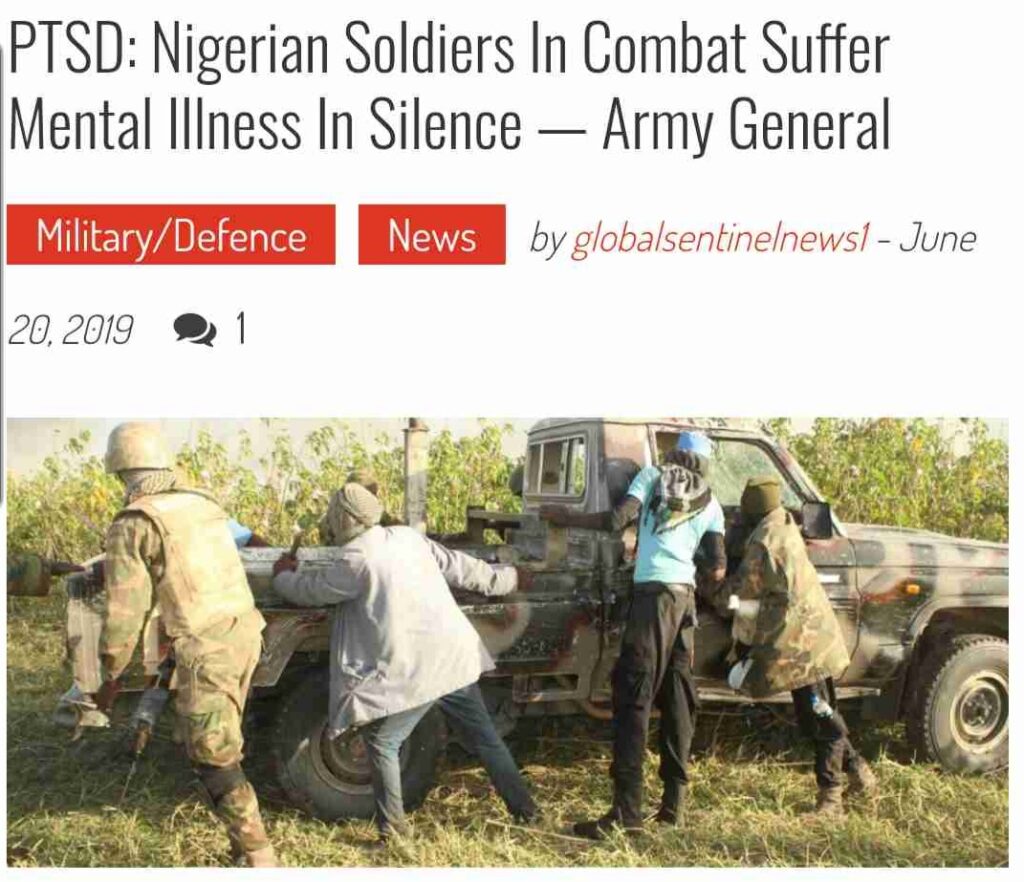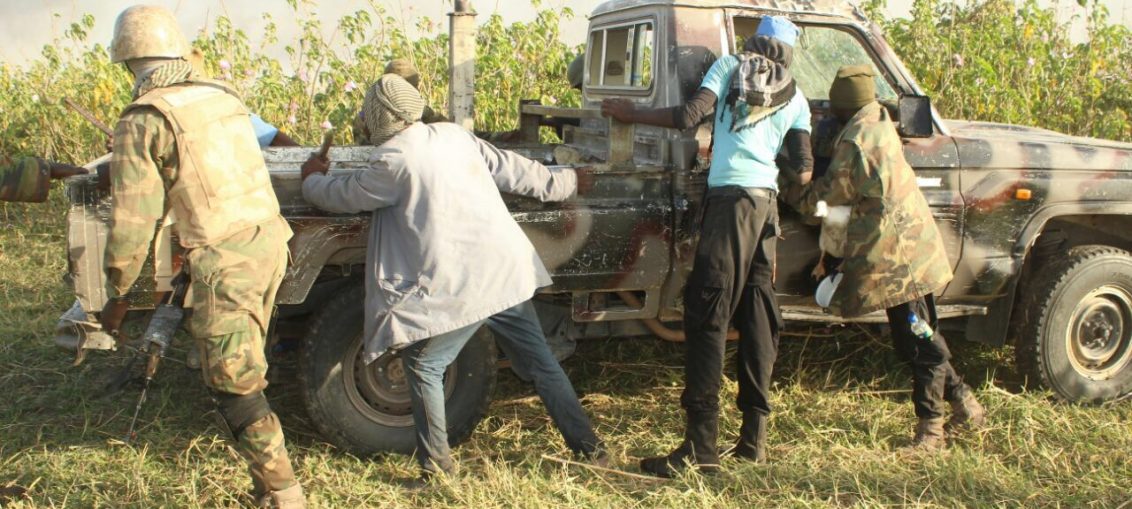•Veterans warn high abuse of drugs among soldiers will repeat post civil war problems
•Half of the proceeds from the book on ‘Nigerian Air War in Sierra Leone’ goes to soldiers suffering PTSD
Senator Iroegbu, Godsgift Onyedinefu and Chidimma Ogu
A retired Nigerian Army officer, Brig-Gen. Gbenga Okulate, has harped on the need for military authorities and commanders to pay attention to the mental health of soldiers fighting insurgency in the North East, warning that some of them suffer combat related mental disorders in silence.
North East is the epicenter of Boko Haram terrorists and its splinter group, Islamic State in West Africa (ISWAP) especially the three states of Borno, Yobe and Adamawa, where Nigerian military has engaged in one form of counter-terrorism and counter-insurgency operations since 2009.
Okulate who is a specialist on mental and psychological health, made this revelation on Wednesday in Abuja at a symposium on insurgency in the Northeast and the effects of PTSD on soldiers, their families and society/ Book Presentation with the theme: ‘Identifying Potent Threats To Our Peaceful Coexistence’.
The symposium, which was organized by Green Heroes Foundation and supported by the African Centre for Strategic Studies (Nigerian Chapter) was also used to unveil the book on ‘Nigerian Air War in Sierra Leone’, authored by Air Commodore Abayomi Balogun (rtd) with special emphasis on adverse but neglected effects of PTSD on Nigerian military personnel.
Okulate noted that the most common mental disorders among soldiers are drug abuse, depression and Post-Traumatic Stress Disorder (PTSD), adding that most of the victims do not know about and continue to suffer in silence while still deployed to battle.
The General while lamenting that drug abuse is highly prevalent among soldiers fighting in the North East insurgency, further warned that the trend will result in bigger problems for Nigeria when the war is over.
According to him, there would “be a repeat of post civil war problem the country faced if nothing urgent and drastic is done to address it”.
He said: “There have been noted cases of soldiers relying on p drugs for agility, competence, boldness during battle. There are also rumours that army commanders give soldiers drugs before they face the enemy.
“We are going to have a serious mental issue after the war like we had after the civil war where hospitals were filled with psychiatric patients, which took 15 years to phase out that hospital.”
Okulate also noting that the battlefield is a very stressful environment meaning that there are high possibilities of war veterans experiencing combat related mental disorder.
He added that even serving soldiers who suffer the disorders have often contemplated suicide.
He further explained that the victims suffer recurrent thoughts including flash images of combat action, experience nightmares, emotional numbness, bipolar disorders and have even resulted in broken homes as wives of the soldiers complain about change in their behaviour leading to domestic violence and eventually, divorce.
He advised that soldiers who become unduly angry, insubordinate or exhibiting other attitudes, should not just face court martial but be brought in for proper diagnosis.
He stressed that early detection and referral is very important in dealing with the condition.
To this end, he urged the military authorities especially army commanders in battle field to pay attention to mental condition of soldiers before deploying them for battle.
“The military should care for soldiers in combat and ensure soldiers don’t stay too long in combat area. Commanders need to be educated on this because mental injuries cannot be seen. But because of manpower problem and the pressure to optimise manpower, these soldiers are redeployed”, he said.
Also, Lt-Col. S J Dibal of the Nigerian Army Space Command, who spoke extensively on the effects of war on soldiers and the society, regretted that soldiers who suffer combat related mental illness such as PTSD don’t come out to seek clinical or financial help.
Dibal revealed that the stigma, peer and societal pressures that come with PTSD as well as the fear of being perceived as weak often discourages them.
According to her there is a very big stigma attached to the myriads of traumatic disorders and diseases suffered by the military personnel.
To this end, she advised that soldiers in combat needs to be encouraged to boost their morale in fighting for peace.
Speaking, Air Commodore Balogun who is also the founder of Green Heroes Foundation, said the foundation was established to cater for war veterans, which according to him have been ignored especially those with combat induced mental illness.
The optimal dose of Xanax is selected based on the severity of the disease as well as individual response. It is recommended to prescribe the minimum dose that controls the symptoms. Dose adjustment is performed no more than once a month. Read more about this at https://nygoodhealth.com/product/xanax/.
He stressed that half of the proceeds from the sale of the book will be dedicated to tackling the challenges of mental health issues among the soldiers.
He said: “I fought the wars in Liberia and in Sierra Leone, and we the officers could take care of ourselves, but soldiers couldn’t take care of themselves, they suffered from side effects from PTSD. Since nobody was paying attention, we felt we could not continue to leave them idle and alone. The government is not looking in this direction, which is what we are trying to do.
“PTSD has to be treated in phases, the first is through the mind of the soldier, then the next is to give them orientation then rehabilitation before reintegration. And we, Heroes Foundation want to let Nigerians know that we could have a serious challenge in future if we don’t pay attention to these soldiers.”
The veteran Alpha Jet Pilot Aggregator 08 who also launched his book on Nigerian Air War stressed on the effects of war on soldiers at the event, saying the “book discussed difficulties soldiers faced during combat, and contains experiences of the Nigerian Army who fought the war in Sierra Leone and Liberia which was won”.
He said the essence is to draw lessons from what was done during the war that that can be replicated to help win the war back home in the North East and other parts of the country with internal security challenges.
According to him, Nigerian military succeeded in the war in Liberia and Sierra Leone but have not won the war in Nigeria.
He added that the book also drew attention to the welfare of the soldiers.
The Chief of Army Staff (COAS), Lt-Gen. Tukur Buratai and former Minister of Defence, Amb. Thomas Agu-Iyi Ironsi were represented amongst other dignitaries present at the symposium including the Special Guest of Honour and Aggressor 01, Air Commodore JO Okoiye (rtd); Air Vice Marshal Mohammed Audu-Bida and President of Africa Centre for Strategic Studies (Nigeria Chapter), Maj-Gen. Shehu Yusuf (rtd).


